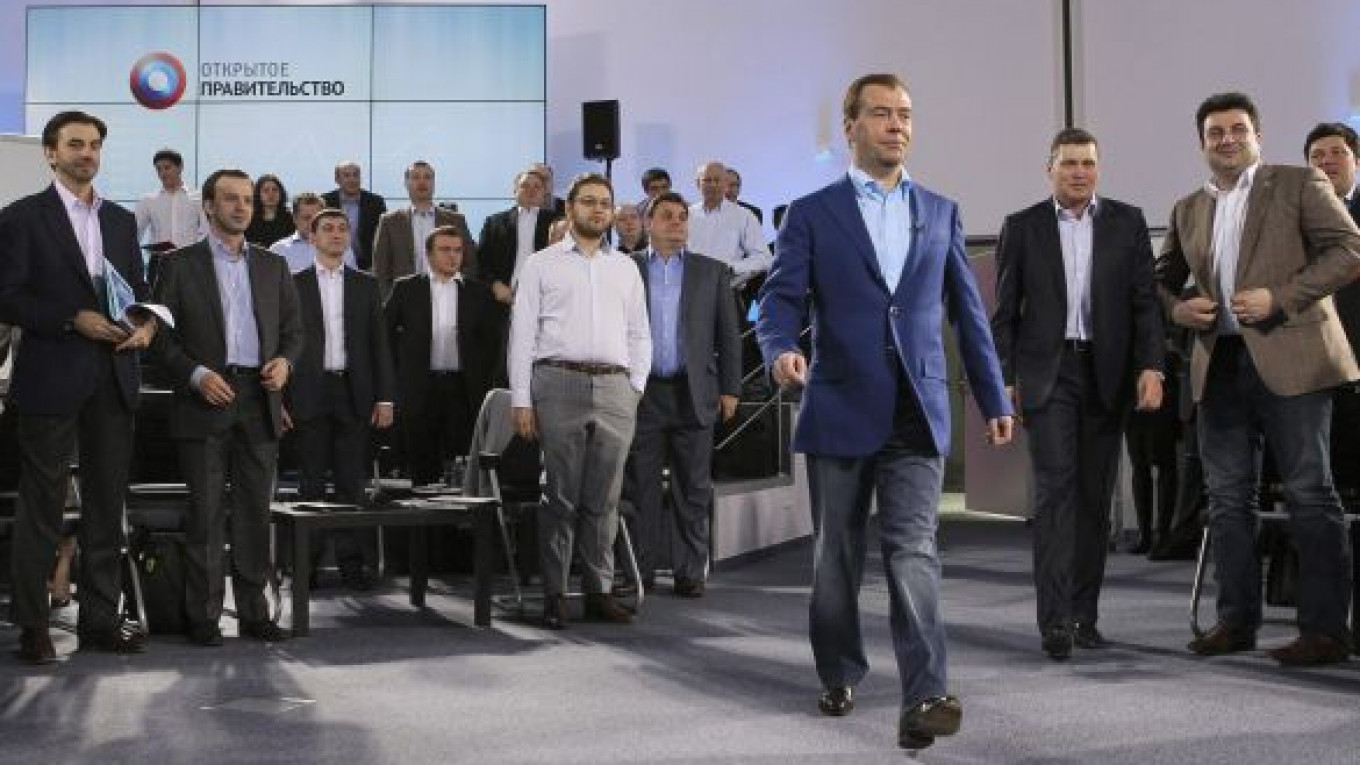SKOLKOVO, Moscow Region — Outgoing President Dmitry Medvedev on Wednesday floated the idea of holding open competitions to recruit several deputy ministers in the future Cabinet that he will likely lead.
"I would like to try this," he said at a meeting outside Moscow, adding that the measure could apply to about 10 such jobs. "It would be interesting."
He also embraced a proposal to make the posts of directors of federal agencies available through similar competitions. There are about 50 federal agencies, which are normally one level below the ministries in the government hierarchy.
"After all, if they can't manage for some reason, we will replace them," he said about the potential newcomers at both the ministry and agency levels.
Medvedev made the statements during a discussion about the need for skilled public servants in the federal and regional governments and ways to open those jobs to people who are outside the entrenched cohort of current bureaucrats. Medvedev debated the issue with his supporters — including business leaders and economists — that make up the group called the "open government." Some other attendees at the Skolkovo School of Management were members of regional governments.
"Wherever you look, there's a shortage of personnel," Medvedev said. "And I mean public service, too."
The corps of federal and regional officials numbers 1.65 million people, he added.
Inevitably for a talk about hiring the best talent, the question of competitive remuneration came up. A few officials, provoked by Medvedev, were strikingly revelatory about their incomes.
Mikhail Pryadilnikov, chief of the City Hall department that coordinates economic development policies, said he made 100,000 rubles ($3,400) a month. His rank deserves a salary of at least 50 percent more, he told Medvedev.
Mikhail Maximov, first deputy prime minister of the Sverdlovsk region around Yekaterinburg and a father of four, stated his monthly salary was also 100,000 rubles.
"To be honest, it's too little," he said.
Medvedev said his administration staff earned an average salary of 100,000 rubles, which is "not little." But he added that it would be fair to apply a system that would make officials' salaries comparable to what the market offers for their skills.
"We need to introduce this system faster than we have been doing," he said.
Economic Development Minister Elvira Nabiullina said Wednesday that she did not know whether she would be in the next Cabinet, Interfax reported.
"It's not for me to say," Nabiullina told reporters, when asked whether she would be in the next government.
"This depends on many factors," she said, adding that the issue of reforming the ministry would "be decided by the new prime minister."
Nabiullina also said she thought the recent presidential election has brought stability but that an attractive investment climate is also needed to reduce capital outflow.
A Message from The Moscow Times:
Dear readers,
We are facing unprecedented challenges. Russia's Prosecutor General's Office has designated The Moscow Times as an "undesirable" organization, criminalizing our work and putting our staff at risk of prosecution. This follows our earlier unjust labeling as a "foreign agent."
These actions are direct attempts to silence independent journalism in Russia. The authorities claim our work "discredits the decisions of the Russian leadership." We see things differently: we strive to provide accurate, unbiased reporting on Russia.
We, the journalists of The Moscow Times, refuse to be silenced. But to continue our work, we need your help.
Your support, no matter how small, makes a world of difference. If you can, please support us monthly starting from just $2. It's quick to set up, and every contribution makes a significant impact.
By supporting The Moscow Times, you're defending open, independent journalism in the face of repression. Thank you for standing with us.
Remind me later.






